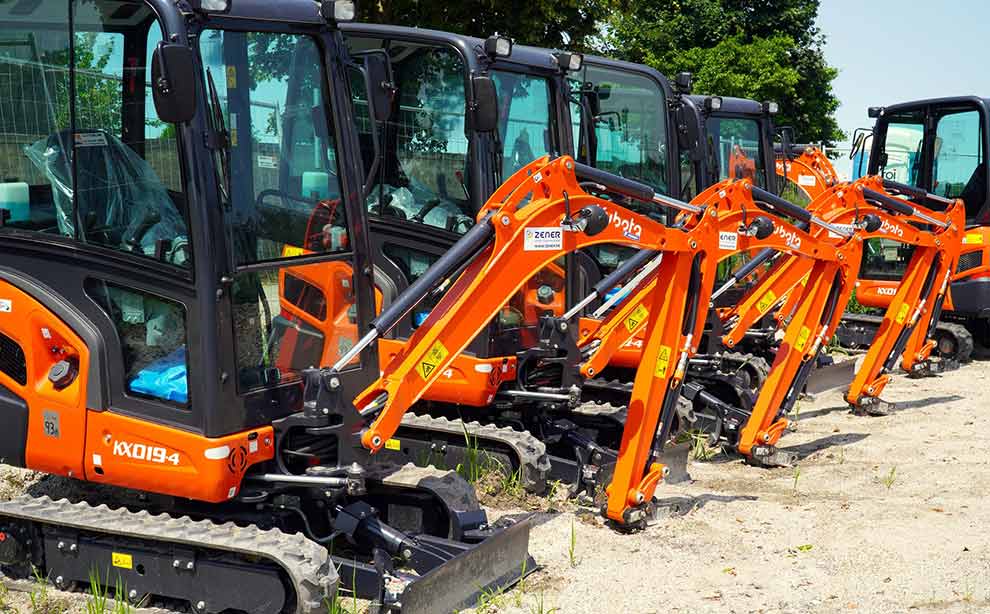Efficient construction equipment procurement is crucial for any construction project’s success. Whether you are a construction company owner or a project manager, the process can be complex and overwhelming. Follow this step-by-step guide to streamline the procurement process and ensure you get the best equipment from the construction equipment auction.
1. Assess Your Equipment Needs

The first step in the procurement of construction equipment is to conduct a comprehensive assessment of your project’s specific requirements. It is essential to consider various factors, including the type of construction project, its size, and its overall scope. Delve into the intricacies of your project to determine the precise equipment necessary to accomplish the tasks at hand. This may include excavators, bulldozers, cranes, and other specialized machinery and tools. By meticulously examining these aspects, you ensure you acquire the right equipment precisely tailored to meet your project’s unique demands, ultimately contributing to its successful execution and timely completion.
2. Determine Your Budget

Once you understand your equipment needs, it’s essential to establish a budget. Begin by thoroughly assessing your financial resources and project requirements. Consider how much you can allocate for equipment procurement without compromising the project’s economic health. It’s crucial to balance upfront costs and long-term maintenance expenses to ensure that your investment remains sustainable throughout the project’s lifecycle. Additionally, factor in any potential contingencies or unexpected expenses to create a comprehensive budget that can adapt to changing circumstances and support the success of your endeavor.
3. Research Equipment Suppliers
Identify reputable equipment suppliers who offer the machinery you require. You can search online marketplaces, visit local dealerships, or seek recommendations from industry peers. Evaluate each supplier based on their reputation, product quality, and pricing.
4. Attend Equipment Auctions
Equipment auctions can be an excellent way to procure construction machinery at competitive prices. Visit online auction platforms that specialize in construction equipment. Scrutinize the listings and participate in timed auctions to secure the best deals. Additionally, consider setting a budget beforehand to ensure you make informed and cost-effective choices when bidding on the necessary equipment. This strategic approach to equipment auctions can help your construction business acquire the required machinery while optimizing your financial resources for other essential aspects of your operations.
5. Inspect Equipment Listings
Before placing bids, thoroughly inspect the equipment listings on the auction platform. Pay close attention to item descriptions, specifications, and photographs. Ensure that the equipment’s condition matches your project’s requirements.
6. Register And Verify

To participate in online equipment auctions, you must register on the platform. Provide accurate information and complete the verification process. This step ensures that only legitimate buyers are allowed to bid.
7. Set A Bidding Strategy
Before the auction begins, establish a clear bidding strategy. Establish the highest bid amount you are prepared to place on each item. Stay caught up in the excitement of the auction and overbidding, as it may exceed your budget.
8. Place Bids Strategically
During the auction, follow your predetermined bidding strategy. Be patient and bid strategically to secure the equipment at a reasonable price. Keep an eye on competing bids and adjust your plan accordingly.
9. Monitor Auction Progress
Stay actively engaged with the auction process. Continuously monitor the progress and consider placing last-minute bids to secure the equipment if necessary. Adhere to your budget and prevent exceeding your allocated spending limit.
10. Winning And Payment

Once you have successfully won an auction, follow the platform’s payment instructions. Make the payment promptly to secure the equipment. Keep all transaction records and receipts for future reference.
11. Arrange For Transportation
After the payment is complete, it’s time to arrange to transport the equipment to your construction site. Coordinate with the seller or auction platform to ensure a smooth delivery process.
12. Conduct Final Inspections

Conduct a final inspection to verify the equipment’s condition upon arrival. Verify that it aligns with the details outlined in the auction listing. Any discrepancies should be addressed immediately with the seller or platform.
13. Maintenance And Support
Ensuring routine maintenance is a crucial factor in extending the longevity of your construction equipment. Establish a schedule and consider maintenance contracts with the supplier or a third-party service provider. It’s critical to have a reliable support system to address any issues that may arise during the equipment’s operation.
Common Procurement Problems
Procurement is an essential process that dictates several aspects of the construction process. It can streamline the whole process, as well as make it more lengthy. As a result, you need to have a clear idea about what to expect.
In this section, we will talk about some of the challenges that you might face while procuring newer materials. This section will aim to educate and provide you with solutions that will enable you to counter it if needed. Let us dive right in without further ado.
Ambiguous Specification
Ambiguous specifications are very common, and as a contractor, you need to know how to deal with it. The very first step that you need to do is to request a proper RFI in order to gain as much clarity as possible about the market and the bulk of the order. Make sure that the RFI you request is up to the mark and is first-party in nature. Subsequently, the RFI is compliant with the design. Like for example, you will be procuring materials for a plumbing project, make sure the materials that you get are in compliant with the requirement. Do not exceed too much.
Submittal Delays
Another very important issue that most contractors will run into is a poorly planned submittal delay. A lack of clear communication channels between the client and the mediator can be one of the reasons behind submittal delays. Therefore, keep an open channel of conversation and coordinate at all points. Do not be afraid to call up your client or vice versa if you feel like things are slacking off. Even though submittal delays are easy to fix, if left unchecked, they can wreak havoc on the procurement process. This, in turn, will jeopardize the whole project.
Budgetary Issues
The construction material market is a dubious space to work in. You can never truly understand the price trajectory. Therefore, it is very important that you have a clear idea about where the price is headed. A sudden spike in the procurement budget can delay the procurement process. As a result, keep buffer funds in place. These funds will enable you to keep the procurement process flowing.
Supply Chain Disruptions
No project can be sustained without a proper supply chain. Hence, you need to have fair clarity about the proper supply chain. Make sure that you understand and account for every step of the supply chain. For example, several projects require specific components that need to be ordered months in advance. Therefore, identify the wait time and the costs in order to have a proper idea about the supply chain and keep it from disrupting.
Payment Delays
Most specialty contractors procure materials on credit. The duration of these credits usually varies from 30 to 90 days. As a result, contractors need to pay up during that period of time. Failing to do so can result in supply chain disruptions. Therefore, understand this cycle and adjust your finances accordingly. Try not to stretch too thin. Always keep funds in order to maintain homeostasis.
Conclusion
Efficient procurement of construction equipment, whether through the construction equipment auction or direct supplier engagement, is critical to any successful construction project. Following this step-by-step guide, you can streamline the process, secure the right equipment at a favorable price, and stay within your budget. Thorough research and careful planning are crucial to making the best decisions for your construction needs, whether for an online construction equipment auction or supplier collaboration.
Additional Reading:























